| Srl | Item |
| 1 |
ID:
119963
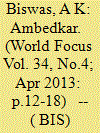

|
|
|
| 2 |
ID:
148849
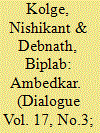

|
|
|
|
|
| Summary/Abstract |
Despite several decades of marginalization by India’s political and
intellectual elite, Dr. B. R. Ambedkar (1891-1956) occupies a major
position in the pantheon of Indian thinkers. In the present political and
academic discourses, Ambedkar and his legacy have acquired a greater
presence than ever before.
|
|
|
|
|
|
|
|
|
|
|
|
|
|
|
|
| 3 |
ID:
152606
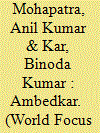

|
|
|
|
|
| Summary/Abstract |
The very essence of Ambedkar’s vision of social justice was to establish a just, equitable and fair society, where the women, scheduled castes and scheduled tribes would get their due place in the society and for that he did incorporate the provisions in the Indian Constitution so that they would get adequate opportunities so that they could be freed from the then prevalent social evils and ill-practices in the society. As an ardent champion of the cause, he sacrificed his whole life for the amelioration of the conditions of such people in the Indian society. Therefore, he is even hailed today as the messiah of the oppressed and downtrodden.
|
|
|
|
|
|
|
|
|
|
|
|
|
|
|
|
| 4 |
ID:
130006
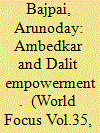

|
|
|
|
|
| Publication |
2014.
|
| Summary/Abstract |
Dr B R Ambedkar was convinced that unless the marginalized sections of Indian society secured the political power, it was not possible to completely wipe out all social, legal and cultural disabilities, from which they suffered (Desai: 1959). Thus, for the political organization and political mainstreaming of Dalits, he pleaded for their representation in legislatures in the Round Table Conferences, 1930-32, convened by the British government. Both Ambedkar and British government supported Dalit representation in the legislatures on the basis of separate electorate, which meant that in the reserved constituencies only Dalits would be allowed to vote. This was the crux of Communal Award announced by the British government in 1932.
|
|
|
|
|
|
|
|
|
|
|
|
|
|
|
|
| 5 |
ID:
119977
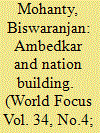

|
|
|
| 6 |
ID:
152635
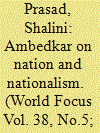

|
|
|
|
|
| Summary/Abstract |
Ambedkar’s notion of nationalism and nation results primarily rest on both political and social aspect. It did not envision a state based on one group dominated body which is primarily the Hindu dominated body. As he was critic on the view of the nationalist leaders like Gandhi and more particularly the Hindu nationalists who just focussed on freeing the country from the clutches of the British rule.
|
|
|
|
|
|
|
|
|
|
|
|
|
|
|
|
| 7 |
ID:
140460
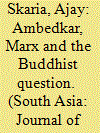

|
|
|
|
|
| Summary/Abstract |
This essay tries to frame one question, which at its most abbreviated can be posed thus: why does Ambedkar convert to Buddhism? Given Ambedkar's militant secularism, to ask this question is also to ask: what assumption of responsibility does that conversion enable which exceeds secular responsibility? This essay tracks how Ambedkar's religion questions both the liberal concept of minority, and the dissolution of the minor that is staged in Marx's critique simultaneously of religion and secularism. Buddhism becomes in the process a religion of the minor.
|
|
|
|
|
|
|
|
|
|
|
|
|
|
|
|
| 8 |
ID:
119976
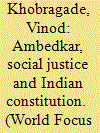

|
|
|
| 9 |
ID:
159383
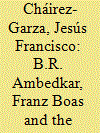

|
|
|
|
|
| Summary/Abstract |
This paper analyses Ambedkar's challenge to racial theories of untouchability. It examines how Franz Boas’ ideas about race, via Alexander Goldenweiser, influenced Ambedkar's political thought. Ambedkar is situated as a thinker aware of larger changes taking place in Western academia in the early twentieth century. During his time at Columbia University, Ambedkar familiarised himself with ideas that rejected the fixity of identities and racial hierarchies; following Boas, he rejected the idea that the untouchables’ place in society was determined by their supposed racial inferiority. Instead, he argued that untouchability was a cultural problem that could be stamped out.
|
|
|
|
|
|
|
|
|
|
|
|
|
|
|
|
| 10 |
ID:
165936
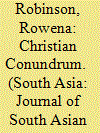

|
|
|
|
|
| Summary/Abstract |
The question of what constitutes the content of civility even as we seek to empty it of rigidly conceptualised Western understandings remains important. An interesting possibility is to reanimate the idea of civility with the notion of trust, but that again begs the question: ‘what is trust?’ My thinking on this subject is framed by constitutional values, and from that perspective, I perceive the ‘civility–trust’ dyad as being the social evocation or impression of the constitutional value of fraternity about which Ambedkar spoke in the Constituent Assembly. He suggested something of a content to fraternity which can then be employed to think through our understanding of civility. Against this backdrop, I listen to the voices of Tamil-speaking Dalit Christians and activists and the ways in which they try to come to terms with and struggle against the forms of incivility and ‘second-class’ citizenship they are up against, and how they make any sense of this with regard to constitutional values and Christian ones, both of which they should be able to lay claim to, but in which they are denied full participation.
|
|
|
|
|
|
|
|
|
|
|
|
|
|
|
|
| 11 |
ID:
082557
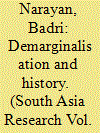

|
|
|
|
|
| Publication |
2008.
|
| Summary/Abstract |
The article demonstrates how the ongoing demarginalisation of Dalits in India today works on a variety of levels. Through creating new narratives and virtually inventing a new alternative history and language, this movement for demarginalisation uses a particular style of popular and widely circulated booklets, vigorously read and disseminated by the neo-literate Dalit population. The construction of this alternative history through such new texts, seen as an existential necessity for the Dalits, works by weaving together stories found in religious Brahminical popular texts about dissenting lower caste characters, glorified as Dalit heroes who fought against upper caste oppression and injustice. It also includes stories of unsung Dalit freedom fighters, transformed into local myths. Importantly, the language used is different from Standard Hindi, since folk proverbs, idioms and symbols, as well as the grammar and vocabulary of local dialects, are used. The article demonstrates in some detail how these processes of constructing new literature work, and indicates that these new sources may well be laying foundations for the histories of the future of many subaltern communities of South Asia
|
|
|
|
|
|
|
|
|
|
|
|
|
|
|
|
| 12 |
ID:
152599
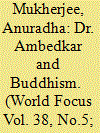

|
|
|
|
|
| Summary/Abstract |
Ambedkar was convinced that conversion will draw the Dalits out of their isolation. To him, Buddhism as a philosophy based on justice and not on the salvation of the soul could be the right religion for the Dalits. It was not meant to be an escape but a collective revolt that also , made a significant step in the resurgence of Buddhism in the country of its origin in all the glory of the humanity it preached.
|
|
|
|
|
|
|
|
|
|
|
|
|
|
|
|
| 13 |
ID:
119975
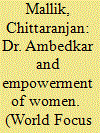

|
|
|
| 14 |
ID:
119972
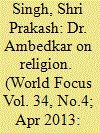

|
|
|
| 15 |
ID:
148848
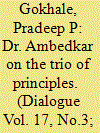

|
|
|
| 16 |
ID:
125319
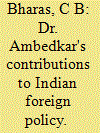

|
|
|
|
|
| Publication |
2013.
|
| Summary/Abstract |
But his earnest efforts on foreign policy making and shaping of foreign affairs of India have been over looked. Today, with the help of development of information technology, scientific and technological and machines and tools, we can understand and come to know many things about this great man.
|
|
|
|
|
|
|
|
|
|
|
|
|
|
|
|
| 17 |
ID:
119966
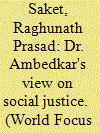

|
|
|
| 18 |
ID:
119973
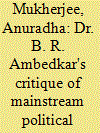

|
|
|
| 19 |
ID:
119979
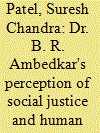

|
|
|
| 20 |
ID:
152627
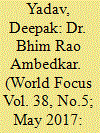

|
|
|
|
|
| Summary/Abstract |
Dr. Ambedkar was a victim of caste discrimination. His parents hailed from the Hindu Mahar caste, which was viewed as “untouchable” by the upper class. Due to this, Ambedkar had to face severe discriminations from every corner of the society. The discrimination and humiliation haunted Ambedkar even at the Army school, run by British government. Fearing social outcry, the teachers would segregate the students of lower class from that of Brahmins and other upper classes.
|
|
|
|
|
|
|
|
|
|
|
|
|
|
|
|